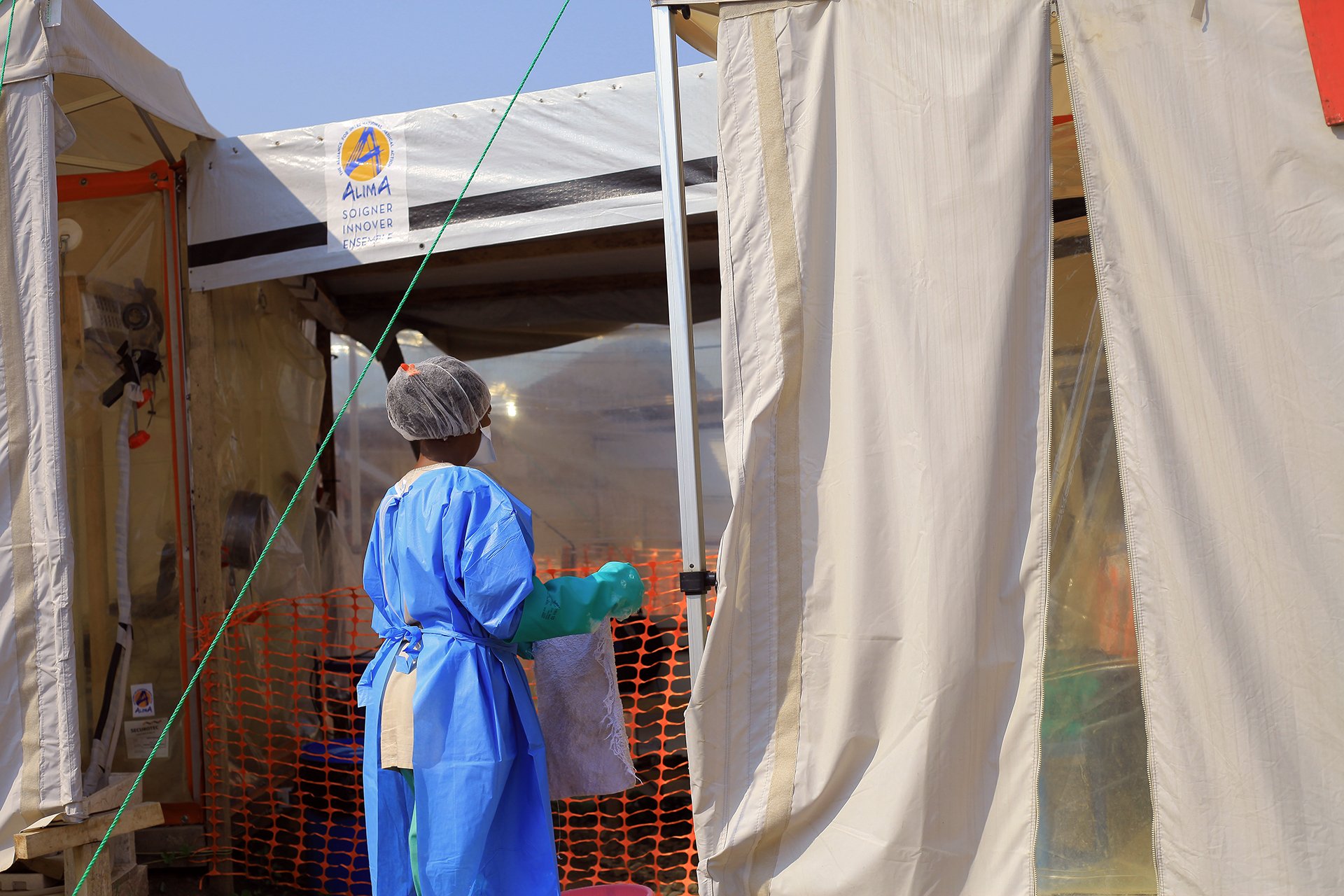As the world’s second-deadliest Ebola outbreak ever continues to ravage communities in the Democratic Republic of Congo, international aid groups are reconsidering the way they respond after a string of attacks by armed assailants on health centres.
Five Ebola treatment centres have been attacked in quick succession in recent weeks, as Congo struggles to contain an eight-month epidemic in the restive eastern provinces of North Kivu and Ituri, where mistrust is reportedly growing among local communities.
This week, the number of cases since the first – believed to be the unsafe burial on 25 July of a woman in the North Kivu town of Mangina – passed 1,000. At 634, the death toll is second only to the 2013-2016 epidemic in West Africa, which claimed more than 11,000 lives.
After attacks on its facilities in late February and early March, Médecins Sans Frontières announced the suspension of activities at two clinics near the epicentre, in the North Kivu towns of Butembo and Katwa, where its infirmaries were destroyed.
The attacks were a “wake-up call and need to be a game-changer for us,” Joanne Liu, international president of MSF, told The New Humanitarian on the sidelines of a press conference in Geneva earlier this month.
“We (need to) take the time to reflect and ask: how did we get there, what did we get wrong, how are we going to change,” Liu said.
At another Geneva press conference, World Health Organisation Director-General Tedros Adhanom Ghebreyesus applauded the commitment of local Ebola responders in North Kivu, which in March he visited for the second time.
He acknowledged the importance of community engagement and local capacity-building, which he said were integrated into the WHO’s latest Strategic Response Plan for Ebola.
After reports that some people in North-Kivu and Ituri can’t understand why they are only being helped now, Tedros sought to provide reassurances that the WHO would not leave the region as soon as the Ebola outbreak is over.
“Our goal should be to help them not only with Ebola, but with the development of their health system,” he said. “That is what they are asking for, and that is what we should do.”
Protracted fighting in eastern Congo has deepened the vacuum for health services in a region where malaria, cholera, and other diseases have killed far more people than Ebola.
Tedros reported a $60 million gap in funding needed for the next six months to end Ebola, and asked partners to fill financial shortfalls.
Local power
Unlike the outbreak in West Africa, the latest epidemic can be contained – to some extent at least – by vaccination. Almost 100,000 people have been inoculated with an experimental vaccine developed by pharmaceutical company Merck.
In what responders call a ring vaccination programme, all known contacts of suspected cases are traced and then vaccinated, along with healthcare workers. But tracking contacts in violence-prone areas like North-Kivu and Ituri is especially hard.
“The only way to get things done is if you are in a community and build trust,” Annie Sparrow, a global health specialist who regularly works in Africa, said during a panel discussion on Ebola response in Geneva, alongside Liu.
It is the local health workers on the front line of Ebola response who are responsible for relaying official health messages, which may or may not be adapted to the community and its resources.
Residents are advised to wash their hands with soap and water or with chlorine when in contact with others during outbreaks, but, for many, access to these means of hygiene may not be possible.
“Community engagement is the new buzzword,” said MSF’s Liu. But it is the affected communities who “are running the show and they have answers, not the foreigner who comes and gives them lessons and preaches to them about what they should do.”
International officials managing the response may be unaware of local conditions. Spontaneous visits by such people to outbreak areas may be resented by local residents as well as local workers, who are paid a fraction of what their Western counterparts earn.
Liu said that while large sums of money have been spent on Ebola response, local communities in afflicted areas in Congo believe “their suffering had been neglected for years”.
“They see fleets of cars driving too fast, hurrying to take away a single sick person and vast amounts of money pouring in, but they don’t see where it ends up,” she said. “They see their relatives sprayed in chlorine and wrapped in plastic bags, buried without ceremony, before seeing their possessions burnt.”
‘Survivors’
MSF’s Liu was speaking before she attended the screening at Geneva’s International Human Rights Film Festival of “Survivors”, a documentary shot in Sierra Leone during the West African epidemic.
While huge strides have been made in containing Ebola and treating patients since the West Africa epidemic, the question of trust – at the various levels of family, community, local, and international actors – remains hugely important and difficult today in Congo.
“We have been out in these streets sacrificing our lives and they use us like a tool,” notes Kadija Kanu, a nurse who recounts her story in “Survivors”. Referring to international humanitarian officials, she asks: “When Ebola started, where were you?”
That question, Liu pointed out, has often left local health workers wondering why the international community responded to Ebola and not to the many other diseases that have taken lives in communities. “This is why it is difficult to build community trust,” she said.
“Survivors” is expected to be subtitled in French for screenings in Congo, as well as Guinea, Mali, and Togo.
(TOP PHOTO: Congo’s ministry of health, together with the World Health Organisation and local and international NGOs, has been tackling the outbreak in North-Kivu and Ituri for nearly eight months. CREDIT: Fiston Mahamba/TNH)
pdd/ag






